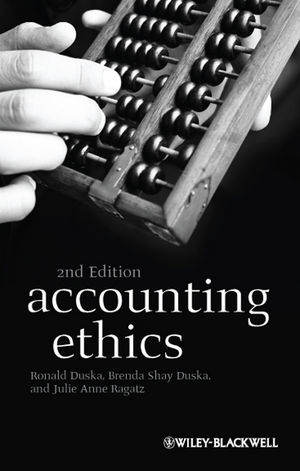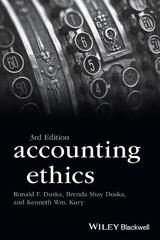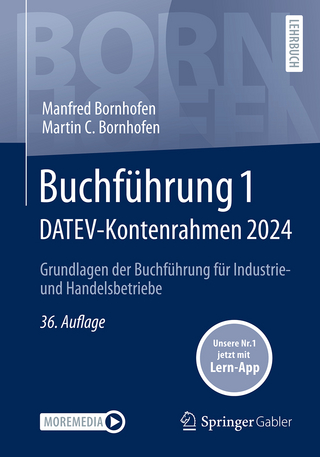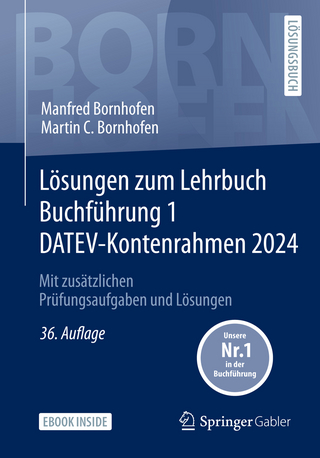
Accounting Ethics
Wiley-Blackwell (an imprint of John Wiley & Sons Ltd) (Verlag)
978-1-4051-9613-0 (ISBN)
- Titel erscheint in neuer Auflage
- Artikel merken
This new edition of Accounting Ethics has been comprehensively updated to deal with the significant changes within the accounting profession since 2002; the authors systematically explore the new range of ethical issues that have arisen as a result of recent developments, including the financial crisis of 2008. * Highlights the debates over the use of fair-value accounting and principles- versus rules-based standards * Offers a comprehensive overview of ethics in accounting, as well as an examination of and recommendations for solving the current crisis in this field * Investigates the nature and purpose of accounting * Uses concrete examples and case studies, including current situations * Examines the ethical responsibilities of individual accountants as well as accounting firms
Ronald Duska is The Charles Lamont Post Chair of Ethics and the Professions at the American College as well as the Director of the Center for Ethics in Financial Services. He is the author and editor of several books including, Contemporary Issues in Business Ethics, Ethics for the Financial Services Professional (with Julie Ragatz, 2008), and Moral Development: From Piaget to Kohlberg. Brenda Shay Duska MT, CPA, is currently a manager at Del Pizzo & Associates, specializing in taxation. She is a member of the Pennsylvania Institute of Certified Public Accountants and the Society for Financial Service Professionals. She serves on the boards of the non-profit, MusicWorks and the Greater Philadelphia Chapter of the Society for Financial Service Professionals. Julie Ragatz is Assistant Professor of Ethics at The American College and the Associate Director of The Center for Ethics in Financial Services. She is currently finishing her PhD in philosophy at Temple University where she concentrates on ethical theory and applied ethics.
Acknowledgments x Preface xii Introduction 1 1 The Nature of Accounting and the Chief Ethical Difficulty: True Disclosure 9 I The Nature of Accounting 10 II Ethics of Disclosure 14 III The Financial Statement 17 IV Roles an Accountant can Fulfill 20 V Development of Explicit Accounting Standards and Regulations 22 VI The Sarbanes Oxley Act (SOX) 27 VII Recent Scandals that Provoked More Regulation 29 VIII Conclusions 30 2 Ethical Behavior in Accounting: What Is Ethics? 31 I What Is Ethics? 34 II Ethics: The Intellectual Enterprise 35 III Actions 35 IV Social Practices, Institutions, and Systems 36 V Why Study Ethics? 36 VI Being Ethical: How to Determine What to Do 38 VII Questions to Ask to Justify An Action: The Basis of Ethical Theory 42 VIII Using the Reasons 46 IX Ethical Dilemmas 47 X Some Classic Moral Dilemmas 48 3 Ethical Behavior in Accounting: Ethical Theory 51 I Egoism 52 II Utilitarianism 57 III Kant and Deontology 61 IV Deontological Ethics 62 V The First Formula of the Categorical Imperative 64 VI The Second Formula of the Categorical Imperative 65 VII Virtue Ethics 66 4 Accounting as a Profession: Characteristics of a Profession 69 5 Accounting Codes of Conduct 77 I AICPA Professional Code of Conduct 79 II Code Principles 80 III Criticisms of the Code of Conduct 92 6 The Rules of the Code of Conduct 93 I Section 100 Independence, Integrity, and Objectivity 94 II Section 200 General Standards Accounting Principles 99 III Section 300 Responsibilities to Clients 102 IV Section 400 Responsibilities to Colleagues 103 V Section 500 Other Responsibilities and Practices 103 7 The Auditing Function 109 I The Ethics of Public Accounting 113 II Trust 115 III The Auditor s Responsibility to the Public 116 IV The Auditor s Basic Responsibilities 118 V Independence 122 VI Independence Risk 127 VII Professional Skepticism 131 VIII Reasonable Assurance 133 8 The Ethics of Managerial Accounting 135 I Reasons Used to Justify Unethical Behaviors 140 II Blowing the Whistle 144 9 The Ethics of Tax Accounting 151 10 Ethics Applied to the Accounting Firm 167 I Accounting as a Business 169 II The Social Responsibility of Business 170 III Good Ethics is Good Business 175 IV Ethical Responsibilities of Accounting Firms 177 V The Accounting Profession in Crisis 177 Afterword: Current Debates on Accounting Issues 185 I Fair Value and Principles vs. Rules 185 II Fair Value Accounting 189 III Arguments For and Against the Fair Value Approach 193 IV Summary 198 V Principles vs. Rules 199 VI Introduction 199 VII Isn t GAAP Already Principles Based? 200 VIII An Example: The Continental Vending Case 204 IX Recent Developments of Present Fairly 206 X A Better Question 207 XI Argument for a Rules Based Approach 208 XII What Would a Principles Based Approach Look Like? The True and Fair Override 211 XIII Argument for a Principles Based Approach 212 XIV Conclusion 215 Appendix A: Summary of Sarbanes Oxley Act of 2002 217 Appendix B: The IMA Code of Conduct for Management Accountants 230 Index 233
| Erscheint lt. Verlag | 18.3.2011 |
|---|---|
| Reihe/Serie | Foundations of Business Ethics |
| Verlagsort | Chichester |
| Sprache | englisch |
| Maße | 156 x 228 mm |
| Gewicht | 366 g |
| Themenwelt | Geisteswissenschaften ► Philosophie |
| Wirtschaft ► Betriebswirtschaft / Management ► Rechnungswesen / Bilanzen | |
| Wirtschaft ► Betriebswirtschaft / Management ► Unternehmensführung / Management | |
| ISBN-10 | 1-4051-9613-0 / 1405196130 |
| ISBN-13 | 978-1-4051-9613-0 / 9781405196130 |
| Zustand | Neuware |
| Informationen gemäß Produktsicherheitsverordnung (GPSR) | |
| Haben Sie eine Frage zum Produkt? |
aus dem Bereich



